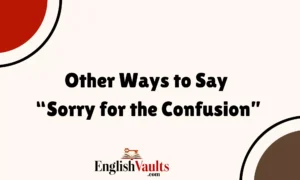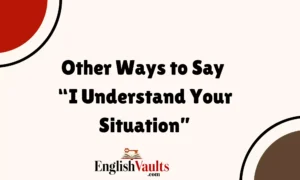In both personal and professional communication, expressing empathy is crucial for building strong relationships and fostering a positive environment. When someone is feeling frustrated, it is essential to acknowledge their feelings and convey understanding. The phrase “I understand your frustration” is often used, but it can become repetitive and lose its impact over time. This article explores 20 alternative phrases that convey a similar sentiment, each tailored to various contexts and relationships.
By using diverse expressions of empathy, you can better connect with others, validate their feelings, and pave the way for more productive discussions. Whether you’re addressing a colleague’s concerns about a project or comforting a friend facing challenges, these alternatives will help you communicate your support and understanding effectively. Let’s dive into these expressions and discover how to articulate empathy more engagingly.
20 Other Ways to Say “I Understand Your Frustration”
- 1. I Recognize Your Feelings
- 2. I Empathize with Your Situation
- 3. I See Where You’re Coming From
- 4. I Appreciate Your Concerns
- 5. I’m Aware of the Challenges You’re Facing
- 6. I Get What You’re Saying
- 7. I Understand This is Tough for You
- 8. I Acknowledge Your Disappointment
- 9. I Realize This is Frustrating
- 10. I Value Your Perspective
- 11. I Understand Your Concerns
- 12. I Can See This is Hard for You
- 13. I Hear You Loud and Clear
- 14. I’m Here to Support You
- 15. I Can Relate to Your Experience
- 16. I Want to Help You Find a Solution
- 17. I Know This Must Be Difficult for You
- 18. I’m Listening to Your Concerns
- 19. I Understand Your Point of View
- 20. I Want to Ensure You Feel Heard
1. I Completely Get Where You’re Coming From
Scenario Example: Subject: Addressing Your Concerns
Hi Tomi,
I wanted to take a moment to express that I completely get where you’re coming from regarding the delays in our project timeline. I understand how frustrating it must be to feel like your efforts are not being recognized, especially after all the hard work you’ve put in.
To address this, I propose that we hold a meeting to discuss the bottlenecks in our process. I believe that collaborating on this issue will not only alleviate some of your concerns but also lead to a more streamlined workflow moving forward.
Looking forward to hearing your thoughts.
Best, Jerry
Addition: Empathy is key to effective communication. Acknowledging someone’s feelings not only validates their emotions but also fosters a supportive work environment. Use this phrase to establish a connection with your colleagues or clients.
2. I Can See Why You’d Feel This Way
Scenario Example: Subject: Your Feedback is Valuable
Hi Tomi,
Thank you for sharing your thoughts with me. I can see why you’d feel this way about the changes in our strategy. It’s understandable that the sudden shift has created some uncertainty, and I appreciate your openness in discussing it.
Let’s set up a time to go over the new plan together and address any concerns you might have. I’m confident that with clear communication, we can align our goals and ensure everyone is on the same page.
Best regards, Jerry
Addition: This phrase emphasizes active listening. By recognizing the other person’s feelings, you demonstrate that their opinions matter, which can enhance collaboration and trust.
3. Your Feelings Are Valid
Scenario Example: Subject: Acknowledging Your Concerns
Hi Tomi,
I hope this message finds you well. I wanted to reach out regarding your recent feedback about our team dynamics. Your feelings are valid, and I appreciate your willingness to express them.
We need to maintain a harmonious work environment, and I’m committed to addressing the issues you’ve raised. Let’s discuss some possible solutions that can improve our collaboration and make everyone feel more included.
Warm regards, Jerry
Addition: Validating someone’s feelings can diffuse tension and foster a more positive interaction. It assures the person that their experiences are recognized, making them more open to dialogue.
4. I Recognize Your Disappointment
Scenario Example: Subject: Let’s Find a Solution Together
Hi Tomi,
I wanted to take a moment to address the recent challenges you’ve been facing with the project. I recognize your disappointment in the way things have unfolded, and it’s completely understandable given the circumstances.
Let’s schedule a time to discuss how we can turn this situation around. I believe that by collaborating closely, we can overcome these hurdles and achieve a successful outcome.
Best, Jerry
Addition: Acknowledging disappointment is crucial in conflict resolution. It helps in creating an open space for discussion and encourages problem-solving.
5. I Understand the Impact This Has on You
Scenario Example: Subject: Your Concerns Matter
Hi Tomi,
I appreciate you bringing your concerns to my attention. I understand the impact this has on you and the team, and I want to ensure that we address these issues as soon as possible.
Would you be available for a meeting this week to discuss this in more detail? I value your input and want to make sure we are all aligned moving forward.
Best regards, Jerry
Addition: This phrase shows that you are not only aware of the frustration but also the broader implications it has on the individual and the team. It emphasizes a commitment to finding solutions.
6. I Hear You Loud and Clear
Scenario Example: Subject: Your Voice is Important
Hi Tomi,
Thank you for expressing your thoughts during our last meeting. I hear you loud and clear regarding your concerns about the project’s direction. I need to understand where everyone stands.
Let’s have a follow-up discussion to brainstorm ways we can improve the situation. I believe that open communication will lead us to a better outcome.
Best, Jerry
Addition: Using a conversational phrase like this can make your communication feel more personal and approachable. It signals to the other person that you are engaged and invested in their concerns.
7. I Understand This Is Frustrating for You
Scenario Example: Subject: Addressing Your Concerns
Hi Tomi,
I wanted to touch base with you about the recent issues with our client. I understand this is frustrating for you, especially since you’ve worked tirelessly to meet their needs.
Let’s arrange a time to discuss how we can improve our approach and ensure that our client feels valued and heard. I’m confident we can turn this around together.
Best, Jerry
Addition: Acknowledging frustration directly helps in validating the other person’s feelings and opens up the floor for constructive dialogue about solutions.
8. I Appreciate Your Patience in This Matter
Scenario Example: Subject: Thank You for Your Understanding
Hi Tomi,
I wanted to take a moment to thank you for your patience in this matter. I appreciate your patience as we work through the challenges we’ve encountered.
Your understanding during this time is invaluable, and I want to ensure we find a resolution that meets everyone’s needs. Let’s discuss how we can move forward effectively.
Warm regards, Jerry
Addition: Expressing appreciation for patience reinforces a positive atmosphere and acknowledges the other person’s effort in managing the situation.
9. I Can Relate to Your Situation
Scenario Example: Subject: Finding Common Ground
Hi Tomi,
I want you to know that I can relate to your situation regarding the recent changes in our workload. It can be overwhelming, and I understand how that can lead to feelings of frustration.
Let’s chat about how we can better distribute tasks to lighten the load. I’m here to help, and together we can find a solution.
Best, Jerry
Addition: Sharing that you can relate to someone’s situation fosters a sense of camaraderie and can help to build trust and open lines of communication.
10. I See Where You’re Coming From
Scenario Example: Subject: Understanding Your Perspective
Hi Tomi,
I wanted to reach out and say that I see where you’re coming from regarding your concerns about the team’s communication. Your perspective is incredibly valuable, and I appreciate your willingness to share it.
Let’s set up a meeting to discuss how we can improve our communication strategy and ensure everyone is on the same page moving forward.
Best, Jerry
Addition: This phrase is particularly useful when addressing conflicts or misunderstandings. It indicates that you are considering the other person’s viewpoint, which can lead to more productive conversations.
11. I Understand This Can Be Overwhelming
Scenario Example: Subject: Your Feedback is Important
Hi Tomi,
Thank you for your honest feedback. I understand this can be overwhelming for you, especially with the recent influx of responsibilities.
I would love to sit down with you and discuss how we can better manage our tasks to ease some of this pressure. Your well-being is a priority, and I want to support you in any way I can.
Best regards, Jerry
Addition: Acknowledging feelings of being overwhelmed can create a supportive atmosphere, encouraging others to share their concerns without fear of judgment.
12. I Want to Acknowledge Your Concerns
Scenario Example: Subject: Let’s Address Your Feedback
Hi Tomi,
I wanted to take a moment to acknowledge your concerns regarding the project timeline. I want to acknowledge your concerns and assure you that I take them seriously.
Let’s schedule a time to discuss the specific areas that are causing you frustration, so we can work together to find a viable solution.
Warm regards, Jerry
Addition: Acknowledging concerns allows for open discussions and emphasizes that you are taking the other person’s feelings into account. It promotes transparency and fosters a culture of honesty.
13. I Can Appreciate Your Position
Scenario Example: Subject: Understanding Your Perspective
Hi Tomi,
I wanted to reach out regarding our recent discussion. I can appreciate your position on the matter, and it’s clear that the changes have affected you significantly.
Let’s find some time to talk about how we can adjust our strategy to better accommodate your needs. Your insights are essential in this process.
Best, Jerry
Addition: Showing appreciation for someone’s position reinforces respect and can lead to a more cooperative environment where everyone feels valued.
14. I Understand That This Is a Challenging Situation
Scenario Example: Subject: Working Through Challenges
Hi Tomi,
I hope you’re doing well. I wanted to check in regarding the recent challenges we’ve faced. I understand that this is a challenging situation for you, and I appreciate your efforts in navigating it.
Let’s set a meeting to explore potential solutions together. I’m confident that, as a team, we can overcome these hurdles.
Best, Jerry
Addition: Recognizing challenges can encourage others to share their thoughts and feelings more freely, creating a collaborative atmosphere where everyone feels heard.
15. I’m Here to Support You
Scenario Example: Subject: Offering My Assistance
Hi Tomi,
I just wanted to reach out and let you know that I’m here to support you during this difficult time. It’s clear that the recent changes have been frustrating, and I want to ensure you feel supported.
Let’s discuss how I can assist you in managing your workload or any specific issues you’re facing. We’re in this together!
Warm regards, Jerry
Addition: Offering support reinforces the idea of teamwork and encourages open dialogue. It shows that you are genuinely interested in helping others succeed.
16. I Want to Help You Find a Solution
Scenario Example: Subject: Let’s Collaborate
Hi Tomi,
I appreciate you voicing your concerns about our recent project. I want to help you find a solution that alleviates some of the frustrations you’ve been experiencing.
Can we meet this week to discuss the specifics? I’m sure that by working together, we can create a more effective approach.
Best, Jerry
Addition: This phrase demonstrates a proactive attitude and a willingness to collaborate. It encourages teamwork and highlights your commitment to finding resolutions.
17. I Know This Must Be Difficult for You
Scenario Example: Subject: Understanding Your Situation
Hi Tomi,
I wanted to reach out about your recent feedback. I know this must be difficult for you, and I genuinely appreciate you bringing it to my attention.
Let’s schedule a time to chat about how we can tackle these issues together. I want to ensure you feel supported and that we’re addressing your concerns effectively.
Best, Jerry
Addition: Acknowledging the difficulty of a situation can create a more empathetic atmosphere. It encourages others to express their feelings without fear of dismissal.
18. I’m Listening to Your Concerns
Scenario Example: Subject: Your Feedback Matters
Hi Tomi,
I wanted to follow up on our previous discussion. I’m listening to your concerns about the project timeline, and I want to make sure we’re addressing them appropriately.
Let’s set up a time to talk about specific steps we can take to improve the situation. Your feedback is crucial for our success.
Best regards, Jerry
Addition: Expressing that you are listening helps to create a safe space for open communication. It encourages people to voice their concerns freely.
19. I Understand Your Point of View
Scenario Example: Subject: Let’s Discuss
Hi Tomi,
Thank you for sharing your thoughts during our last meeting. I understand your point of view on the recent changes, and I appreciate your willingness to express your thoughts.
Let’s schedule a meeting to discuss how we can move forward together and address any lingering concerns.
Best, Jerry
Addition: Acknowledging another’s point of view promotes mutual respect and can pave the way for more collaborative decision-making.
20. I Want to Ensure You Feel Heard
Scenario Example: Subject: Your Feedback is Important
Hi Tomi,
I wanted to reach out to you about your feedback regarding the project. I want to ensure you feel heard and that your concerns are taken seriously.
Can we meet this week to discuss your thoughts in more detail? Your input is valuable, and I want to make sure we’re addressing your needs.
Warm regards, Jerry
Addition: Ensuring that someone feels heard is essential in maintaining positive relationships. It encourages openness and builds a foundation for constructive conversations.










